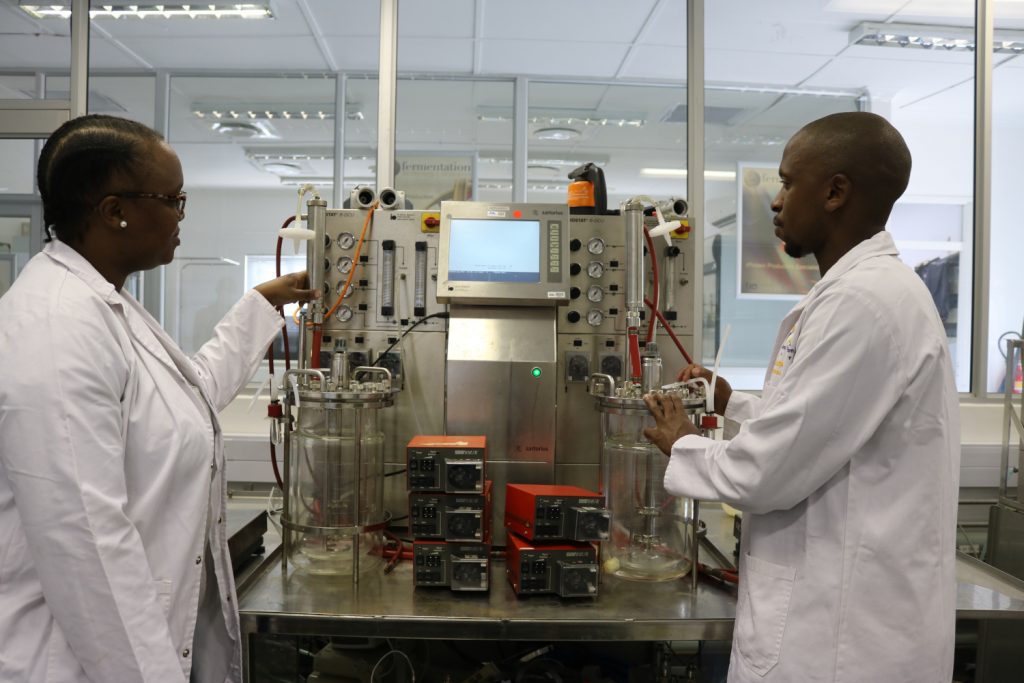Patrick Krappie, acting CEO (TIA); Thabiso Ramasike, Board Member (TIA); Mboneni Muofhe, DDG (DSI); Matsie Modise, Board Chairperson (TIA); Buti Manamela, Deputy Minister, Higher Education, Science & Innovation; Dr Hannes Malan, MD, (CPT Pharma); front: Sebenzile Matsebula, Board Member (TIA)
The Department of Science and Innovation’s (DSI) Bio-Economy Strategy aims to drive South Africa’s bio-economy through the exploitation of the country’s diverse natural resources such as animals, plant biodiversity, micro-organisms and minerals, to improve human health, address food security and contribute to economic growth. The strategy seeks to use South Africa’s bio-based resources to create and grow biotechnology-based industries. This is crucial for job creation, contribution to GDP, exports, the building of industries and addressing market failures, by harnessing human capital, financial resources, infrastructure and knowledge.
The Technology Innovation Agency (TIA), an entity of the DSI, plays an important role in the implementation of the Bio-Economy Strategy. The Agency is mandated through the Technology Innovation Agency Act, No. 26 of 2008, to promote the development and exploitation of innovations and technologies in the public interest.
Through its bio-economy strategic pillar, TIA supports the translation of South Africa’s knowledge resources into sustainable bio-based solutions for impact through the convergence of specific focus areas, namely Health, Indigenous Knowledge Systems (IKS), Agriculture and Industrial Biotechnology. In addition, TIA manages cross-cutting Technology Platforms, Technology Innovation Clusters and Programmes.
 Nolwazi Nduli, Research Scientist and Vukile Zulu, Intern, operating the Biostat B Reactor at the Bioprocessing Platform
Nolwazi Nduli, Research Scientist and Vukile Zulu, Intern, operating the Biostat B Reactor at the Bioprocessing Platform
The successes of the initiatives demonstrate TIA’s position as an able collaborator to deliver on critical interventions necessary to support the state on its path of inclusive economic growth and social development. The agency is well placed to support innovation in bio-based technologies that will transform not only the economy but the lives of ordinary South Africans.
TIA established the Technology Platforms Programme aimed at facilitating access to cutting-edge technological capabilities by investing in and supporting entities to acquire appropriate technologies and expertise that lower the barriers to innovation. Its objectives include the optimisation of public investment in technology platforms, the use of platform capabilities to support human capacity development, the facilitation of the commercialisation of technologies through partnerships and the leveraging of funds into programme activities.
Through the Technology Platforms Programme, TIA has established capabilities in various biotechnology focus areas nationally:
- Three “omics” centres with expertise in genomics, proteomics, metabolomics and bioinformatics;
- Africa’s first integrated drug discovery and development centre;
- A bioprocessing and rapid diagnostics product development facility;
- A body imaging facility possessing two imaging modalities, namely, magnetic resonance and Positron emission tomography;
- A facility to support the development of African traditional medicines and natural products that can be validated for safety, efficacy, and quality; and
- A Biosafety Platform that supports regulators, innovators, and consumers to engage on biosafety risk assessment issues that lead to the sustainable development of biotechnology products.
The Technology Innovation Cluster model is TIA’s approach for assessing value chains and stimulating the development of activities and interventions to facilitate sector- or industry-level engagement through a cross-cutting approach. This approach is intended to address systemic weaknesses that hamper innovation and commercialisation beyond just the provision of funding to individual projects.
TIA has funded four bio-based Technology Innovation Clusters since establishing the initiative. These are the Active Pharmaceutical Ingredients Cluster, the Medical Device and Diagnostics Innovation Cluster, the Animal Health Cluster, and the Forest Bio-Economy Innovation Cluster. The DSI Nuclear Medicines and Biosciences Programme, the Beef Genomics Programme and the Dairy Genomics Programme are also managed by TIA.
TIA has invested R15 million towards the establishment of the API Cluster, to focus on the synthesis of small-molecule APIs for human health using modern manufacturing technology. To ensure the commercial translation of the API molecules synthesised toward full-scale production, the cluster has also established a dedicated pilot-scale, regulatory compliant API chemical laboratory, which will support the analytical testing required during the synthetic process of API molecule development. This laboratory will serve the analytical needs within the API Cluster and be accessible to all industry partners. The laboratory is hosted by CPT Pharma (Pty) Ltd and will play a critical role in technology translation between Higher Education Institutions and manufacturing scale-up. It costs South Africa R15billion a year to import most of the APIs used to formulate medicines in local plants. This dependence has at times led to import and distribution problems.
The Medical Device and Diagnostics Innovation Cluster (MeDDIC) is a partnership between the South African Medical Research Council and TIA which aims to create an integrated ecosystem that will collectively address major industry challenges, by converging strategic competencies to achieve the common goal of a sustainable and competitive medical devices and diagnostics industry. Medical devices and diagnostics are vital in the detection, prevention, and management of diseases. Over R7 million has been invested towards medical devices already in South Africa’s public sector market.
 Dr Vuyisile Phehane, Executive:
Bio-Economy Division at TIA
Dr Vuyisile Phehane, Executive:
Bio-Economy Division at TIA
MeDDIC has provided a support grant to the CSIR for assisting local companies with preparing technical dossiers for SAHPRA registration. The programme seeks to fund opportunities to localise the manufacture of key components or of complete medical devices.
TIA’s interventions in the agricultural sector have significant potential for impact on job creation, support to commercial and smallholder farmers and the informal market, to ensure food security.
The Agriculture Bioeconomy Innovation Partnership Programme (ABIPP) is a partnership programme led by the DSI and industry. This is a mega-programme that funds, facilitates and manages multi-disciplinary and multi-institutional research programmes. These programmes focus on agricultural bio-innovation, product processes and services contributing to increased productivity, food security and sustainable rural development. The programme encourages collaboration on national priorities and promotes the global competitiveness of the local agricultural sector.
Among the successes of the ABIPP is the quantum of co-funding attracted from various public and private partners. The co-funding has allowed for greater economic and societal impact. An example of this is the Marula Value Chain project, which is a joint development agreement between TIA and the IDC and is an example of a successful public sector collaborative initiative that addresses national priorities.
The Ukhanyo Farmer Development (UFD) programme aims to assist smallholder maize farmers in the Eastern Cape province by providing mentorship, training and support for increased yields and sustainable farming practices. The programme addresses the challenges of safe storage of maize through a developed post-harvest technology transfer programme, and the process of Nixtamalization.
The Industrial Biocatalysis Hub (IBH), is a platform for the industrial assimilation of biocatalysis technologies conceptualised to reduce the risk associated with the adoption of bio-based technology by industry. The IBH supports biocatalysis through human capital development, applied research and development and technology transfer. The hub has the potential to deliver high-end biocatalysis innovations for local production and export to global territories.
The portfolio and pipeline investees such as Biodx (Pty) Ltd, Enzyme Technologies (Pty) Ltd, Khepri Innovations (Pty) Ltd, and Lignorganic (Pty) Ltd have developed processes that utilise vegetative waste by-products from the agricultural industry, to produce high-value products with commercial application in various sectors including cosmetics, mining, and crop and animal health.
TIA funding and support of innovations has enabled the government in reducing current imports and the creation of sustainable jobs through the commercialisation of locally developed technologies. The strategic goal of TIA, namely, to make a positive impact on the economy of South Africa, is illustrated through the afore-mentioned examples of systemic interventions, as it implements the objectives of the Bioeconomy Strategy. Accordingly, human capacity development, research excellence, access to next-generation technologies, providing incentives and adequate funding, access to global intellectual property through in-bound technology transfer, alignment with national priorities, regulatory support and information dissemination have been supported.
The future of the country’s citizens is secured through the continued coordinated interventions by TIA, Science Councils, Higher Education Institutions, government and the private sector. A better life for all is attainable, as promised by the constitution of South Africa.